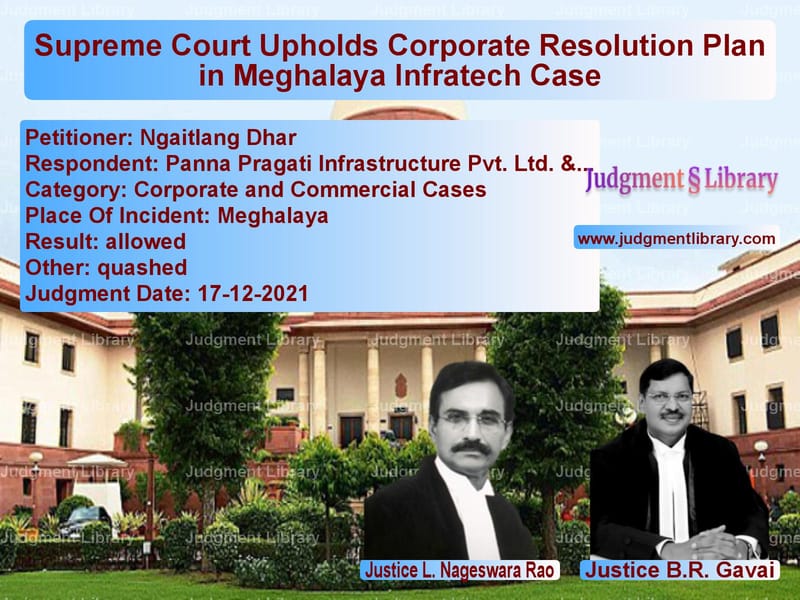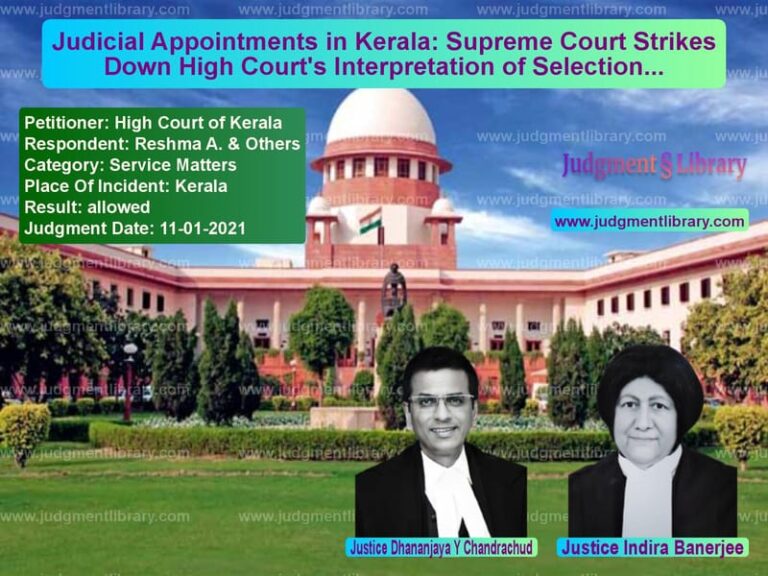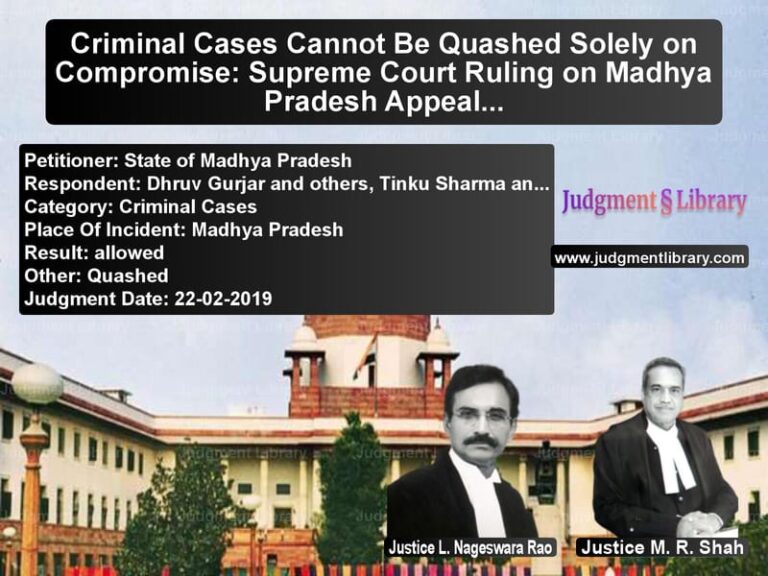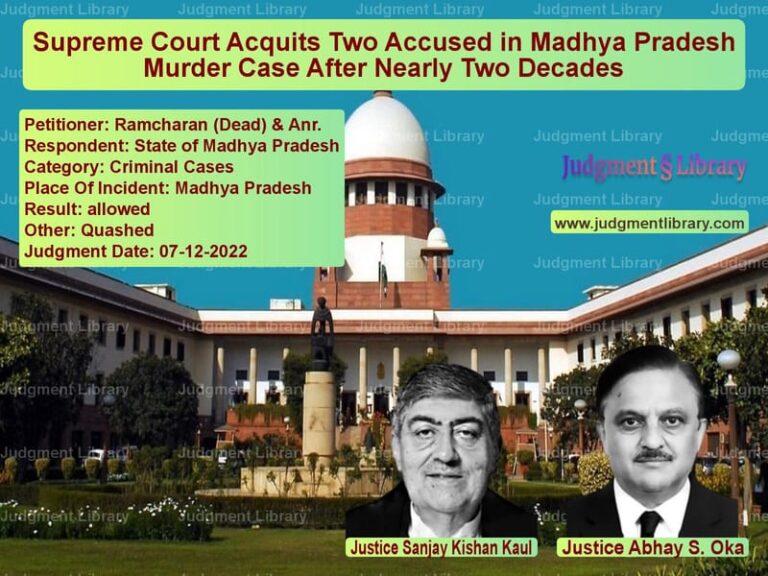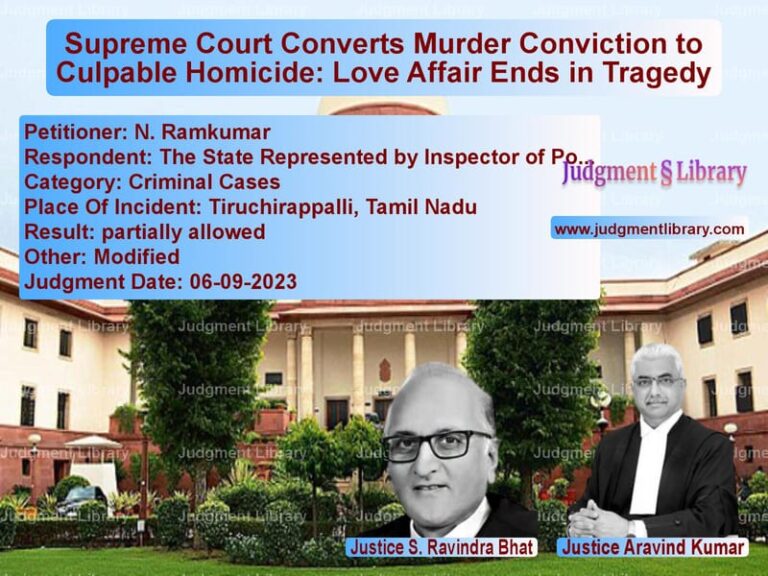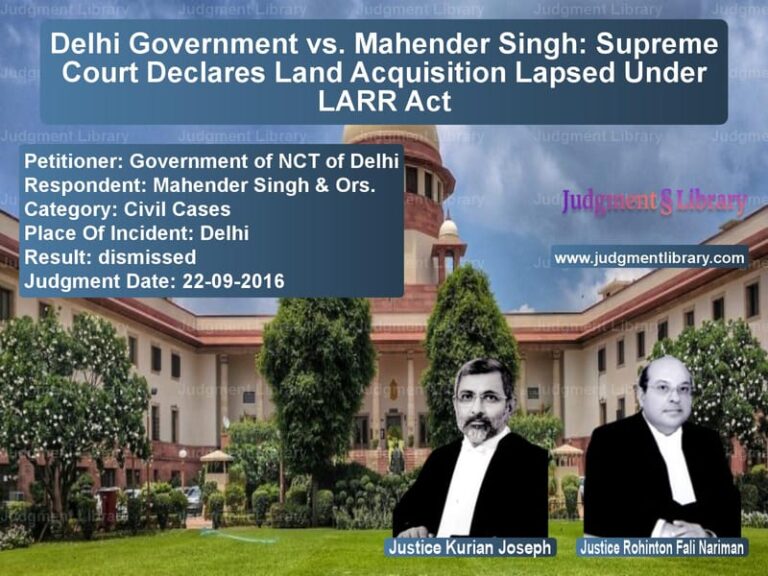Supreme Court Upholds Corporate Resolution Plan in Meghalaya Infratech Case
The Supreme Court, in the case of Ngaitlang Dhar vs. Panna Pragati Infrastructure Pvt. Ltd. & Ors., delivered a landmark judgment on corporate insolvency, reinforcing the principle that courts should not interfere with the commercial decisions of the Committee of Creditors (CoC). The ruling, which set aside the decision of the National Company Law Appellate Tribunal (NCLAT), upheld the sanctity of the Insolvency and Bankruptcy Code, 2016 (IBC) and its objective of ensuring the time-bound resolution of financially distressed companies.
Background of the Case
The dispute originated from the corporate insolvency resolution process (CIRP) of Meghalaya Infratech Ltd., a company undergoing financial distress. The process was initiated under Section 7 of the IBC following an application by Allahabad Bank (now Indian Bank). The National Company Law Tribunal (NCLT) admitted the application and appointed Amit Pareek as the Resolution Professional (RP).
The Insolvency Resolution Process
Once the CIRP was initiated, the RP invited Expressions of Interest (EOI) from prospective resolution applicants. The following four entities submitted resolution plans:
- Panna Pragati Infrastructure Pvt. Ltd. (PPIPL)
- Ngaitlang Dhar
- Abhishek Agarwal
- Ashish Jaisasaria & Others
Following several rounds of bidding, Ngaitlang Dhar emerged as the highest bidder (H-1 bidder) with an upfront payment offer of ₹64.30 crore. The CoC, exercising its commercial wisdom, approved his resolution plan with a 100% voting share.
Dispute Over Consideration of a Revised Offer
After the CoC had finalized its decision, PPIPL, one of the resolution applicants, sought to submit a revised offer of ₹65.65 crore. The RP refused to consider this late submission, stating that allowing a revised bid after the process was completed would violate IBC guidelines and disrupt the time-bound resolution process.
PPIPL challenged this decision before the NCLT, which upheld the RP’s decision and approved the resolution plan submitted by Ngaitlang Dhar. However, PPIPL then appealed to the NCLAT, which overturned the NCLT’s ruling and directed the CoC to consider PPIPL’s revised offer.
Key Legal Issues
- Whether an applicant can submit a revised resolution plan after the bidding process has concluded.
- Whether the commercial wisdom of the CoC is subject to judicial review.
- Whether timelines prescribed under IBC can be relaxed in the interest of securing a higher bid.
Arguments Before the Supreme Court
Arguments by Ngaitlang Dhar (Appellant)
The appellant, represented by senior advocate Kapil Sibal, contended that:
- The finalized bidding process could not be reopened to entertain PPIPL’s higher offer.
- IBC mandates a strict timeline to ensure an efficient resolution of corporate insolvency.
- Allowing late bids would discourage resolution applicants from making their best offers in the first instance.
- The commercial decision of the CoC, which had already approved his plan with a 100% voting share, should not be interfered with.
Arguments by PPIPL (Respondent)
PPIPL, represented by senior advocate Dr. Abhishek Manu Singhvi, argued that:
- The CoC must secure the best possible financial outcome for creditors.
- IBC does not explicitly bar the consideration of late bids if they are in the best interest of creditors.
- Since PPIPL had made a higher financial offer than the approved plan, it was the duty of the CoC to reconsider the allocation of assets.
- The principle of maximizing value must override procedural technicalities.
Supreme Court’s Analysis
1. The Finality of the Bidding Process
The Court reaffirmed that once a bidding process has concluded, allowing a new offer would set a dangerous precedent, leading to unnecessary delays and uncertainty in insolvency proceedings.
“A resolution applicant cannot be permitted to alter or enhance its bid after the process has been concluded and the highest bidder has been finalized.”
2. Role of Commercial Wisdom of the CoC
The Court emphasized that the CoC, comprising financial creditors, is best positioned to decide on the viability and feasibility of resolution plans. Judicial interference should be minimal:
“The CoC has the exclusive domain to decide on the feasibility and viability of a resolution plan. Courts should not interfere unless there is a material irregularity.”
3. Importance of Timely Resolution
The Court held that the IBC was enacted to ensure the time-bound resolution of distressed companies. Permitting last-minute revisions would defeat this purpose:
“The insolvency resolution process is bound by strict timelines. Any undue delay defeats the objective of the Code.”
4. Revised Offers Post-Bidding Cannot Be Considered
The Court ruled that once the CoC had approved a plan, it was not open to the NCLAT to interfere and allow a revised offer.
“Reopening the process to accommodate revised bids would undermine the discipline and transparency required in insolvency proceedings.”
Final Judgment
The Supreme Court set aside the NCLAT’s order and restored the NCLT’s decision approving the resolution plan of Ngaitlang Dhar. The key takeaways from the judgment include:
- The CoC’s commercial decision is final unless there is a clear material irregularity.
- The timelines prescribed under IBC must be strictly followed.
- Last-minute bid revisions disrupt the insolvency process and should not be entertained.
Implications of the Judgment
This ruling has far-reaching implications:
- It reinforces the supremacy of the CoC in insolvency resolution matters.
- It ensures that IBC remains a time-bound process and does not become subject to prolonged litigation.
- It discourages bidders from adopting a wait-and-watch approach and incentivizes them to submit their best offers in the first instance.
Conclusion
The Supreme Court’s judgment in this case is a reaffirmation of the core principles of the IBC. By upholding the resolution plan approved by the CoC, the Court has sent a strong message that judicial intervention in commercial decisions must be minimal and that the integrity of the insolvency resolution process must be preserved.
Petitioner Name: Ngaitlang Dhar.Respondent Name: Panna Pragati Infrastructure Pvt. Ltd. & Ors..Judgment By: Justice L. Nageswara Rao, Justice B.R. Gavai.Place Of Incident: Meghalaya.Judgment Date: 17-12-2021.
Don’t miss out on the full details! Download the complete judgment in PDF format below and gain valuable insights instantly!
Download Judgment: ngaitlang-dhar-vs-panna-pragati-infras-supreme-court-of-india-judgment-dated-17-12-2021.pdf
Directly Download Judgment: Directly download this Judgment
See all petitions in Bankruptcy and Insolvency
See all petitions in Corporate Compliance
See all petitions in Company Law
See all petitions in Judgment by L. Nageswara Rao
See all petitions in Judgment by B R Gavai
See all petitions in allowed
See all petitions in Quashed
See all petitions in supreme court of India judgments December 2021
See all petitions in 2021 judgments
See all posts in Corporate and Commercial Cases Category
See all allowed petitions in Corporate and Commercial Cases Category
See all Dismissed petitions in Corporate and Commercial Cases Category
See all partially allowed petitions in Corporate and Commercial Cases Category

